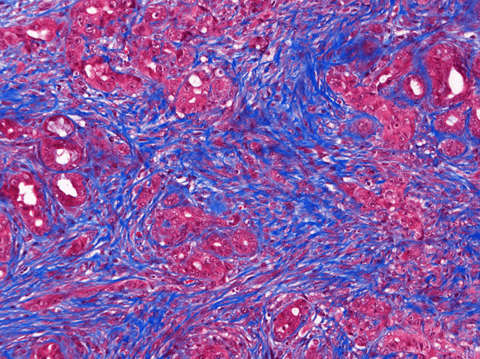Pancreatic cancer is one of the deadliest forms of cancer, displaying only a 6 percent survival rate that has remained stable for decades. It is the cause of death for late celebrities Steve Jobs and Patrick Swayze, and about 40,000 people in the US die from this disease annually (1). This aggressive cancer employs a wound-repairing mechanism called fibrosis to create a barrier of defense from the immune system. In order to establish this barrier, pancreatic cancer cells use pancreatic stellate cells, which are cells surrounding the pancreatic tumor, to provide materials the cancer needs to thrive and protect itself from chemotherapy. In a recent study conducted on mice at the Salk Institute in La Jolla, CA, treatment using a synthetic derivative of Vitamin D successfully inactivated these protective stellate cells, rendering pancreatic cancer vulnerable to attack from chemotherapy (2).
Since pancreatic cancer has adapted to create enzymes to destroy Vitamin D, a synthetic Vitamin D analog called Calcipotriol is necessary to combat the cancer. Ronald Evans, director of Salk’s Gene Expression Laboratory and senior author of this study, states that after exposing mice with pancreatic ductal adenocarcinoma to chemotherapy in addition to Calcipotriol, the mice survival rate increased by 57 percent (2). Due to these promising results, the Food and Drug administration has approved human trials for this novel approach to battling cancer (2). Since it attacks the wound-repairing mechanism of fibrosis, Calcipotriol treatment may also have beneficial implications for other robust carcinomas, such as lung, kidney, or liver tumors. Scientists like Evans hope that this unique approach of altering the microenvironment in which cancers thrive will lead to additional research that could help save millions of lives.
Sources:
1. Healey, M. (n.d.). A vitamin D variant may be key to treating deadly pancreatic cancer. Los Angeles Times. Retrieved October 10, 2014, from http://www.latimes.com/
2. Jennewein, C. (n.d.). Salk: Vitamin D Derivative Can Help Beat Pancreatic Cancer. Times of San Diego. Retrieved October 10, 2014, from http://timesofsandiego.com/


Leave a Reply